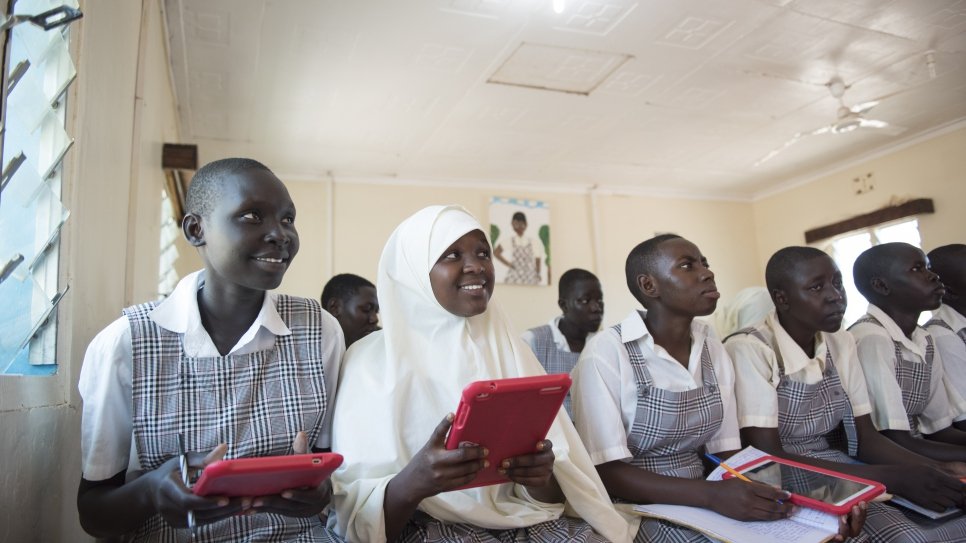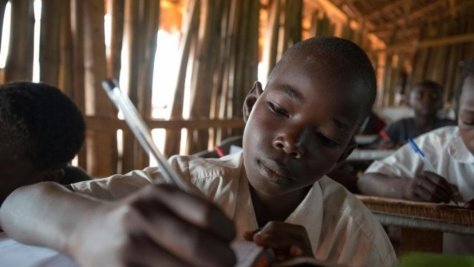Vodafone Foundation
About the partnership
Since: 2013
Locations: Kenya, Democratic Republic of the Congo, Tanzania, South Sudan
Refugee classrooms are perhaps the toughest in the world. Throughout East Africa, teachers are routinely working in under-resourced classrooms, trying to meet the needs of a large number of mixed-age and mixed-ability learners. Fostering quality learning in these environments remains a constant challenge for even the most talented teachers. This is especially difficult when teachers do not have access to dynamic or current educational resources.
In response, the Instant Network School (INS) was designed to address learning resource needs. In collaboration with the Vodafone Foundation and refugee communities, UNHCR has developed and adapted INS to meet context-specific challenges. Instant Network Schools provide a holistic solution to transform an existing classroom into a multimedia hub for learning – complete with a local network; internet connectivity; sustainable solar power; a classroom kit that includes tablets, a laptop, a projector and speaker; localised digital content; and a robust teacher training programme with a library of digital educational resources.
Initially developed in Dadaab, with the testing of 13 centres in 2013, each expansion of the INS has adopted a community-driven model whereby the design is co-developed with members of the school community. Through this process, the locations (schools or community centres), the inclusion of specific resources, the training plan, and the programmatic agenda are determined, building on the national priorities and resources. Each Instant Network School is supported by a local coach who provides in-service training and support for learners and teachers. Daily logs of INS use are recorded and uploaded to a global platform; which helps to track utilization, flag challenges, and identify areas for re-design or capacity building.
In December 2019, Vodafone Foundation and UNHCR announced the expansion of the programme to benefit 500,000 refugee and host community students and 10,000 teachers with 255 new Instant Network Schools by 2025.
In February 2020, Vodafone Foundation and UNHCR appointed footballer Mo Salah as the first Ambassador for Instant Network Schools. In his role, Mo Salah is helping raise awareness of the need and importance of quality education for refugee children and for greater investment in digital technology, to provide students with a connection to the outside world and a chance to shape their own futures.
Impact at a glance
- Since 2013, Vodafone Foundation has been a flagship partner for UNHCR in both innovation and education, helping to expand refugees’ access to education and connectivity through the Instant Network Schools programme.
- To date, the programme has benefited over 86,500 students and 1,000 teachers ensuring that refugees and children from the communities that host them have access to accredited, quality, and relevant learning opportunities. There are 36 Instant Network Schools currently operating across eight refugee camps in Kenya, Tanzania, the Democratic Republic of the Congo and South Sudan.
- The Instant Network Schools programme is a rare example of an education technology programme that works effectively within schools in refugee camps and achieves impact because of its holistic approach.
- INS has helped refugee children as well as teachers become more motivated and confident and has the potential to have catalytic impact across the education sector.
- Vodafone is UNHCR’s largest corporate partner for Connected Education.
Sustainable Development Goals in focus
- SDG4 Quality Education
- SDG17 Partnerships for the Goals
Contact us
If you are interested in exploring a partnership with UNHCR, please contact us at [email protected].


